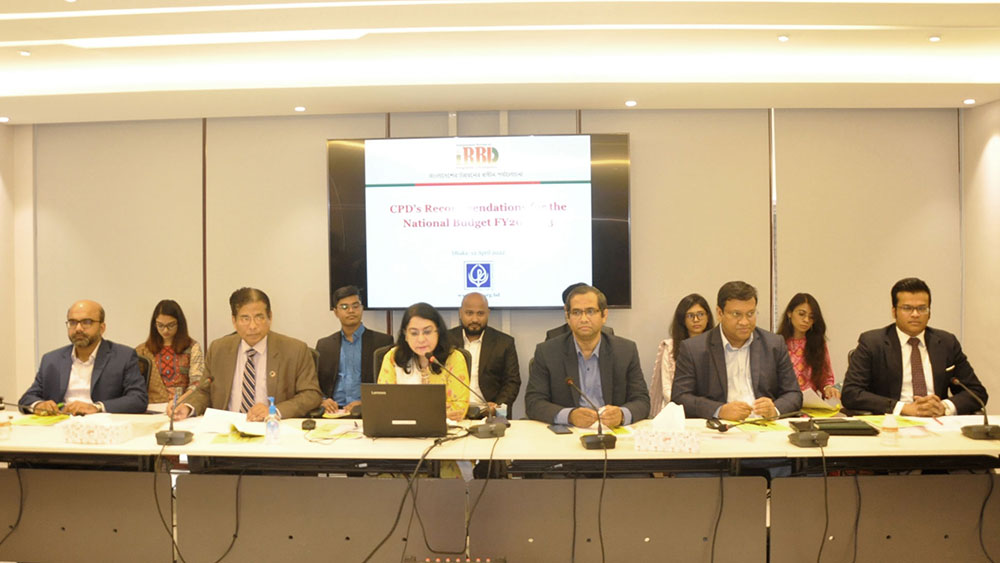
The national budget for FY2022-23 is going to be placed before the National Parliament in the backdrop of a number of unprecedented challenges that inform Bangladesh’s macroeconomic management in the prevailing context. The country is still in the phase of recovery from the COVID-induced adverse implications that visited the economy over the past two years. The prices of essential items have been on the rise, both because of imported inflation and various domestic factors. All components of the external balances – trade, current account and overall – have been experiencing significant pressure, with rising foreign borrowings and anticipated growing pressure on future debt servicing liabilities. In this backdrop, the Centre for Policy Dialogue (CPD) has proposed a number of fiscal budgetary measures and initiatives, keeping in the purview the upcoming FY2022-23 budget in its media briefing on Recommendations for the National Budget FY2022-23, held on 12 April 2022. The media briefing was organised under CPD’s flagship programme Independent Review of Bangladesh’s Development (IRBD).
Dr Fahmida Khatun, Executive Director, CPD made the keynote presentation at the media briefing on behalf of the IRBD research team. The philosophy embedded in budgetary proposals in developing country context is redistribution of income favouring the marginalised groups and communities. In the context of Bangladesh, this is even more urgent in view of the rising income and wealth inequalities which have been further accentuated by COVID-19 and the rising pressure on purchasing power of the common people leading to erosion of real income. CPD hopes that the government will look at FY23 budget as an opportunity to secure the well-being of the marginalised people, revive the COVID-impacted economy and stimulate private sector investment.
The presentation by Dr Fahmida Khatun further stated that the government is also having to take cognisance of its election pledges, which has been demonstrated in recent times by way of policy statements as regards introduction of universal pension scheme, formulation of draft anti-discrimination law, introduction of child budget and implementation of the national social security strategy adopted earlier. The budget will also need to take cognisance of the ramifications of Bangladesh’s dual graduation. The budget will also need to be aligned with the aspirations expressed in the government’s Vision 2041 with the ambition of meeting SDG targets by 2030 and graduating to an upper middle-income country by 2031 and a high income country by 2041.
CPD’s budget proposals are informed by an anticipation of significantly increased subsidy requirement in view of rising global prices. People’s welfare and purchasing capacity rather than the extent of budget deficit should inform the budgetary stance for FY23. The interests of consumers, farmers and producers should remain the major concern of policymakers. CPD has argued favouring restructuring of incentives towards export and market diversification and continuation of support to incentivise inward remittance flows. Restructuring of the subsidies should entail both reduction (e.g., subsidies for capacity payment in energy), continuation (e.g., remittance) and enhancement (e.g., food and fertiliser. A key strategical anticipation in this regard is that the high prices are of transitory in nature and that the price levels would revert back to the historical trends if the current scenario involving Russia and Ukraine changes for the better in the near-term future.
To raise well-being of the people, expansion and scaling up of social safety net programmes have been proposed by the CPD, particularly in view of the adverse footprints of the pandemic. CPD has argued for consolidation of SSNPs and introduction of universal coverage for children through the proposed MCBP under the ambit of a separate Child Directorate mandated to integrate and implement all child-focused programmes. The presentation also proposed separate programme for workers including provision for comprehensive health insurance.
The Budget for FY23 ought to be informed by a number of hard policy choices. In order to contain the budget deficit, CPD has proposed measures to enhance domestic resource mobilisation and raise both capacity and efficacy of public expenditure. To ease the burden of rising prices and shrinking purchasing power of low- and fixed-income earning people, CPD has proposed that measures be taken to selectively reduce taxes at import and domestic stages and stabilise the exchange rate.
The government should set up an independent oversight mechanism to examine feasibility and assess economic and financial returns, financing modality, debt-servicing liability and ensure overall good governance in implementation of the infrastructure projects. CPD has stressed the need to implement the long-overdue reform measures including the direct income tax act and reforms of the SOEs and has reiterated the need to undertake a comprehensive public expenditure review and set up an independent banking reforms commission. From a medium-term perspective, concrete steps and allocations have been urged in view of the transition from fossil-fuel based energy to renewable energy and the urgency of embedding green growth in development strategy.
Professor Mustafizur Rahman, Distinguished Fellow, CPD; Dr Khondaker Golam Moazzem, Research Director, CPD and Mr Towfiqul Islam Khan, Senior Research Fellow, CPD were also present at the event and shared their views through responding to questions from the media.

